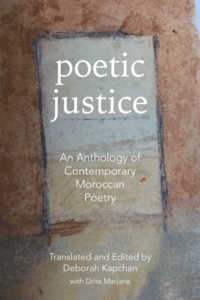In the dead gardens of the poem that possesses me
I know that a sky in the form of a living bed
will easily contain my silences, my myths
forged in the same clay as a god dreaming
of unbearable interstellar shipwrecks
the fable of the world that tells my heart
about the red flame of legendary amazons
that it revives in the middle of our fear
so there are no longer any futures without faces:
My illiterate warrior ancestors
nomadic in their pieces of land
feel the freshness of moons at their feet
I hear them chanting when they pray
incomprehensible verses of the Quran
their dreams always stopping in front of the Black
Stone I see them, crazy skeletons coursing
through the limbs of paradises of sadness
From petals of blood they plait shrouds
dying once more for the love of fauns
and gorging without a single respite until night
surrounded with manuscripts and illuminations
Who will tell their naïve truths?
the defeats gloved by deep burns
that old ones never discuss?
Their tomblike identity has been erased
for so long
May the red flame of legendary amazons
live in my heart.
May it revive in the midst of our fear
So there are no longer any futures without faces
Translated by Guggenheim Fellow Deborah Kapchan, who is an ethnographer and Professor of Performance Studies at New York University.
__________________________________

From Poetic Justice: An Anthology of Contemporary Moroccan Poetry, edited by Deborah Kapchan. Used with the permission of University of Texas Press. Copyright © 2021 by Ahmed Bouanani.
Ahmed Bouanani
Ahmed Bouanani (1938-2011) published one novel L’hôpital—a cult classic of contemporary Moroccan literature—and three books of poetry: Les persiennes, Photogrammes, and Territoires de l’instant. He also directed several short films and one feature, Mirage, widely considered a milestone in North African cinema. In a sense, however, Bouanani’s oeuvre is still forthcoming: his death uncovered dozens of completed yet unpublished manuscripts, spanning many genres—poetry, fiction, plays, film scripts, essays, history books, as well as drawings and graphic novels. He shunned the limelight and, unless friends forced his hand, avoided sending his work to publishers. Paradoxically, this obstinately silent writer was part of a most vocal generation of artists gathered around the journal Souffles, to which Bouanani was an early contributor. He was obsessed with the preservation of collective memory, and with the project of telling a people’s history of Morocco beyond official narratives, be they colonial or post-colonial. Combining high literary standards with constant political concern, his work was important for rethinking North African literary and cinematographic modernity in relation to oral traditions and popular culture.













